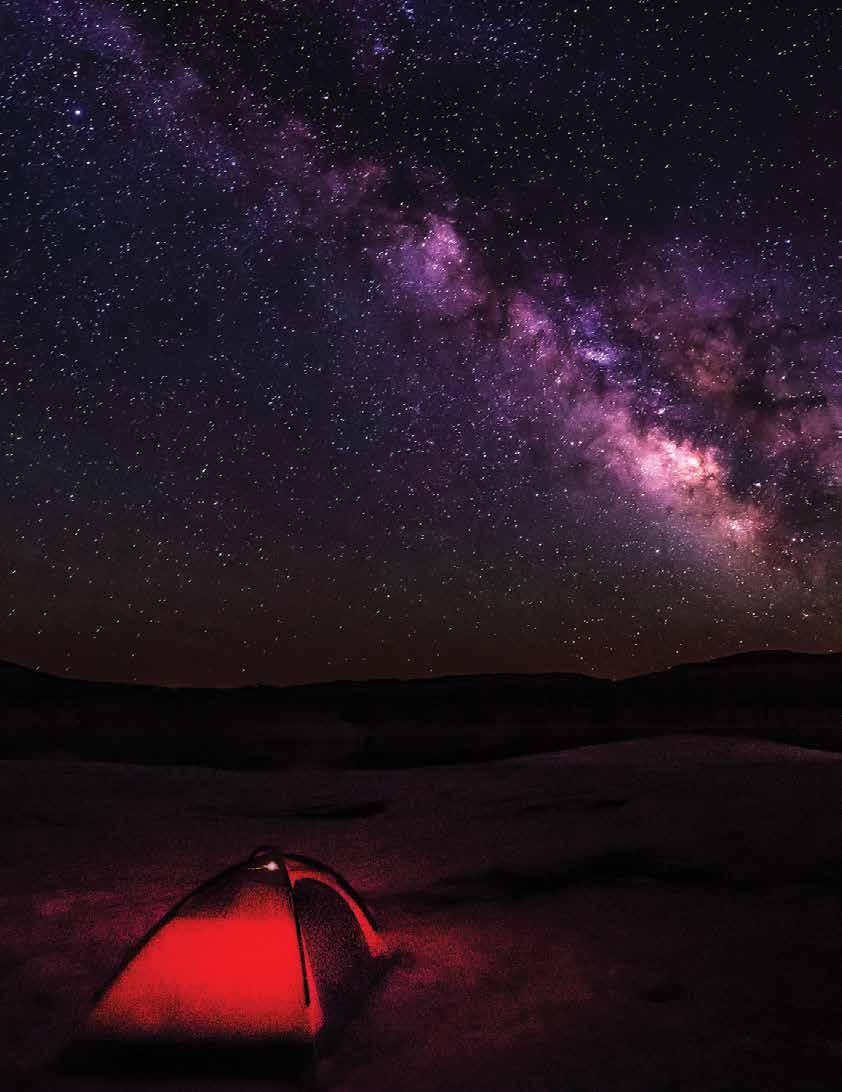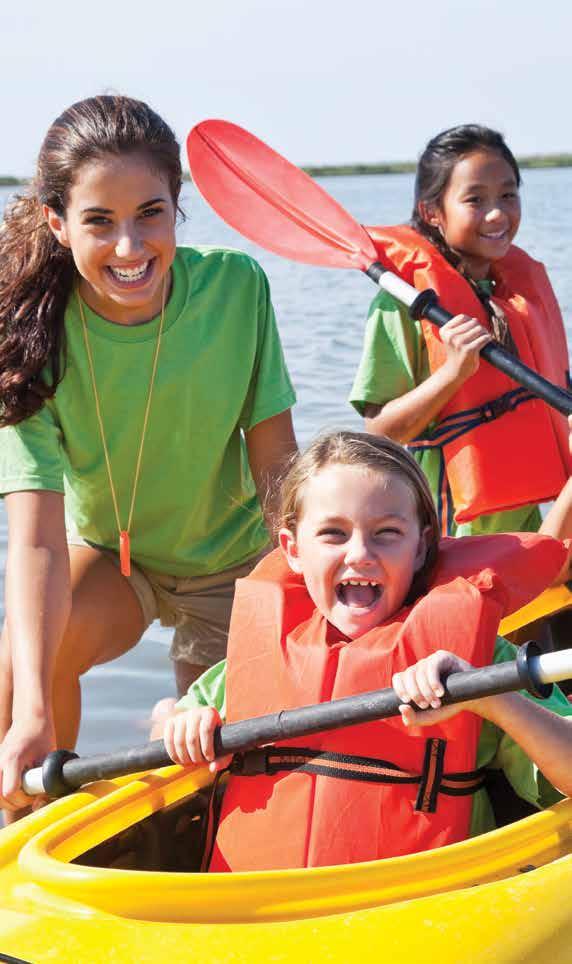
12 minute read
Happy Campers
TALES AND TIPS TO ENSURE YOUR CHILDREN HAVE FOND MEMORIES OF SUMMER SLEEP-OVER CAMP
BY JANICE F. BOOTH
So begins attorney Chuck Parson’s tale of prattle and pranks that ended with the screaming new-boys racing off to their bunks to escape the half-spider, half-gorilla that attacked them as they lounged around the campfire on their final night. “The next morning the counselors came around to our bunks to assure the first-timers that by surviving that fright-of-our-life, we 10- and 11-year-olds had crossed from boyhood to manhood that night. My self-confidence soared. There might even have been a bit of a swagger in my gait when my parents picked me up from camp.”
Sometimes, summer camp is just a week away from those endless chores at home, like making your bed and taking out the garbage. But sometimes summer sleepover camp changes the way a child sees herself—her abilities and her strength. What can grown-ups do to make a summer sleepover camp experience as positive as possible? And, what pitfalls might we guard against as we help children acquire more self-reliance through their sleep-over camping adventures?
“I think the most valuable thing I learned at camp was to ask for help,” Jessica Brodt observes. She spent a week last summer studying piano at the Kieroff Academy in Georgetown, D.C. Jessica, a junior at Broadneck High School and member of their Performing and Visual Arts Program, was encouraged by her music teacher, Yesook Suh, to apply to the renowned Kieroff Academy’s summer camp for young performers. “I learned so much, and not just about music and performing…Most of the students were from South Korea. Only four of us were Americans,” she says. “Everybody spoke Korean, or, almost everybody. I used my Google translator app a lot. The food was mostly Korean...It was very competitive. I got to attend master classes, one-on-one with world-renowned artist…The Korean students practiced all the time. There were 40 piano students and 15 pianos. It took a while for me to figure out when I could practice…I really learned not to let obstacles get me down; I learned coping skills and to be prepared for anything. For example, cold showers! There didn’t seem to be any hot water; we took cold showers. Eventually, someone figured out how to jiggle the faucets so hot water came out. Coping skills.” Jessica’s advice to summer campers, “Be prepared for anything.” We all want those affirming experiences for our children. We want summer sleep-over camp to build confidence and provide experiences that are unique, fun, and valuable. So, now that we have a few examples of camping adventures, here are some general tips to help you and your children get the most out of that week or two away from home.
IS THIS THE RIGHT TIME?
Deciding, first, when it’s time to encourage a child to try a sleepover camp can be a tough call. Educators and child psychologists suggest somewhere between eight and nine years old may be a good age to start sleepover camp. You are the best judge of your candidate’s comfort level with being away from familiar surroundings. Can he spend an entire day away from home, away from parents and siblings? Has she been comfortable staying overnight at a friend or relative’s? Did he introduce the idea of going away to camp? How did she react when you suggested spending a week away at camp? The answers to those questions can guide your decision about whether to move forward with a sleepover camp, or perhaps simply find a day camp that might be preparatory to next summer’s sleep-over camp adventure.
CHOOSING A GOOD FIT
Once you’ve decided whether your child is ready to leave the family for a week or possibly longer, you might want to work together with your son or daughter to research the right camp experience for her or him. Ask your child to tell you what she thinks would be fun to do at camp. Maybe he wants to hone his skills as a drummer. Or, perhaps she knows of a great soccer camp she wants to attend.
There are camps for children with physical limitations, camps for kids with diabetes, or asthma, kids in wheelchairs, or who are blind. There are camps for children mourning the loss of a parent or recovering from other traumas. Is your child interested in music or theater? Does he want to dance or paint landscapes? Perhaps she wants to learn more about birds, or edible plants, or ecology. Whatever a child’s interest, perceived or nascent, there’s a camp for that. It may prove fun to research the choices with your future camper, let her feel she has a stake in the choice. (A caution, however, on this point: If budget is a concern, be sure to prepare your child for that restriction. Provide age-appropriate guidelines for choosing a camp based on cost, distance, or any other factors you know must be considered.)
GROWN-UP RESEARCH INTO THE CAMP YOU’RE CONSIDERING Once you’ve got a list, or a camp in mind, you will want to do some investigations on the matters only adults can judge. Sometimes your concerns can be quickly resolved by friends who’ve sent their children to a particular camp and know the camp’s specifics. The reputation of some camps, particu larly specialty camps, like the Kieroff Academy that Jessica attended, may be well-established. Well-established camps usually have extensive information on their web sites. You can begin your own, grownup research with the American Camping Associa tion’s Guide to Accredited Camps: www.acacamps. org. There are often regional camp guides that provide a starting point for your investigation. You’ll find local camps listed in this magazine as well.

Some of the areas you may want investigate before encouraging your child’s interest in at tending a particular camp: 1. What is the camp philosophy, and does it fit with your family’s? 2. Who is the director? What is her/his background? Questions about the staffing of the camp include: 1. How are staff selected? What percentage of staff return for more than one season? 2. What training is provided to camp counselors? Are all staff involved with the campers every day? 3. What is the counselor to camper ratio? Regarding safety measures: 1. Are there medically trained staff members? 2. How do counselors handle water safety? Hiking precautions? Weather related dangers, such as rain storms and wildfires? 3. In the event of a serious injury or medical emergen cy, how are campers cared for and where are they taken for emergency treatment? 4. What are the rules for counselors? For campers? And how are they enforced? 5. What are the costs? Are there additional expenses, such as fieldtrips or supply costs, that should be taken into consideration?
FIGURING IT OUT TOGETHER
This next step may be lots of fun and give you some fresh insights about your child. Together, create a list of qualities you and your child want for a camp experience. He might say, “I want to sleep in a tent.” Or she might list, “They have to serve mac-andcheese at least once while I’m at camp.” Or maybe, scratch the mac-and-cheese and add kale and broccoli.
While your future camper is making a list, you can insert some pertinent issues of your own. For example: What’s a normal daily schedule? What are the activities, and what happens if a camper doesn’t want to participate in a particular activity? How do counselors handle homesickness? Discipline: What happens if there are arguments between campers? Bullying? Inappropriate language or behavior?
With the final, joint list, you can set up a phone conference with the camp’s director, you, and your child participating. You’re modeling for your child a great way to handle interviews for jobs, school, or any other decision involving other people and organizations. this may depend, in part, on the age of your camper. Camp policies for children under the age of 13 might be quite different from policies for teen campers or for specialty camps, such as computer camps, of course. Do you want your child to be able to call you at any time if she/he feels the need? Are you hoping for a cellphone decoupling period while your camper is in the wilds?
Usually, there are some natural barriers to extensive use of technology while at camp. Nature camps are often out of reach of the regional cellphone towers. Signals for phone or internet are weak or nonexistent. Kids in tents are not going to have outlets for charging cellphone and iPads. So, technology might be a non-issue.
Most camps do have a clear policy on technology, often posted on the camp’s web site. What are the consequences for non-compliance? One camp warns on its web site, in several places, that any cellphone found in the possession of a camper will be confiscated and donated to the town’s homeless shelter. Cellphones, once confiscated, will not be returned.
TECHNOLOGY: CELLPHONES, IPADS, AND ELECTRONICS AT CAMP
A critical issue for you and your camper may be the camp’s regulations on children’s use of smartphones and computers. Before you can evaluate the camp’s approach to this topic, you need a clear idea of how you think technology should be handled by the camp. And, After you’ve read the policies of the camp, if you think they’re wise, discuss those policies with your child. Some camps plan for certain times of day or days of the week when campers can access camp-provided computers that have Internet access, so children can email Mom and Dad rather than write a letter on that blank sheet of paper with its self-addressed, stamped envelope–the old-fashioned way.
OPENING OR EX- PANDING COMMU- NICATIONS WITH YOUR CAMPER
Once you and your camper have chosen the right camp, the shopping and pack- ing get underway. While you’re work- ing together sorting clothes and packing up equipment, this is a great opportunity to encourage your young camper to talk about all sorts of things: What do you think it will be like to sleep in a lodge with five other girls? How do I know I’ll like going canoeing? What if I fall in? I don’t like to be in the dark; what if I can’t find my way to the bathroom at night? What if you feel tired when it’s time to get up in the morning?

There are all sorts of questions that may be lurking in your camper’s imagination. You can help him by posing “What if…?” questions. Do some problem solving and role-playing. Laughter can defuse anxiety, de- flate looming dangers. While you’re folding t-shirts and sorting socks, invite her to describe what she thinks will happen on the first day at camp. Ask him what he’ll do if he doesn’t like what’s being served for breakfast. Their answers may surprise and delight you.
A FEW ODDS-AND-ENDS
Just a few final tips that don’t fit into categories but may be of help as you and your child plan the summer’s camping adventure:
• If you’re not sure if your child will be able to sleep away from home, try a practice. Arrange a sleepover for your future camper at the home of a friend or relative. Try to make it a two-night experience. With two nights, there may be some tears that first night, but by the second night, your child may be too exhausted from having fun to miss you.
• If your child is not accustomed to being outdoors for extended periods, plan some trips to local and regional parks and bird sanctuaries. Take a hike together; eat a picnic in the woods. Go through the drill of dress
ing appropriately, covering face and hands with sunscreen, and spraying oneself with bug repellant. If your camper knows the drill, she can gain some credibility helping fellow campers do the right things.
• For very young campers, help him or her practice the basics of self-care. Be sure he can brush his own teeth properly – using toothpaste. Allow her to lace up those hiking boots or sneakers herself. Let your child select the appropriate jacket and hat for the weather conditions. Your camper will gain confidence and experience.
• Notify the camp director of any personal, social, or health issues that may have popped-up between the time you filled out all the paperwork for your camper and the time she arrives. Did his dog die? Has she developed

an allergy to tomatoes? Are his wisdom teeth coming in, causing toothaches?
Here’s an easy, stellar hint: Mail two or three letters and postcards to your camper before they leave for camp. That postcard of the Chesapeake Bay will be waiting for her on her cot. Your letter with a photo of Mom and Dad will be a real comfort to him that first night or two.
“Amy” in her “Thoughtful Parent” blog reminds us, “Summer camp builds resilience. Children experience ‘tolerable risks’ and gain skills in coping and identity-formation.” She points out that young campers learn to cope with unpredictable circumstances, adapt to physical challenges, and make new friends. Visit thoughtfulparent.com for more advice.
Annapolitan Pat Patten recalls experiences long ago and far away. “When I was a little girl, two friends and I went across the New Orleans Causeway to summer camp in Slidell, Louisiana. What I loved most was the marsh, just outside the building where we slept. We went out in boats to see the cypress trees and the ugly Garfish. Nutria pelts the Cajuns hung out to dry impressed me. We saw snakes and birds. That’s where I really came to love the outdoors, even though I didn’t like the dark water of the lake where we had to practice swimming. I wrote letters home with stories about our adventures.”
If your child’s summer, sleepover camp experience achieves these valuable goals and provides such charming memories, the resources and time you invested in providing this experience will be amply rewarded.

















